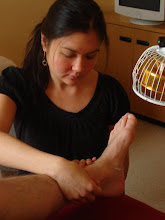Don’t let allergies ruin your summer! - Tips to help you feel your best this allergy season.
Allergies are usually associated with the Spring or Fall, but especially where I practice in the Northeast, it is not uncommon to see allergies occurring right in to the summer, or even all year round (perennial)—these are often connected to chronic food sensitivities and gut imbalances (see below).
Since warm, sunny weather seems so fleeting in the Boston area, most of us want to take full advantage of it. Summer is a time to be enjoying the outdoors—hiking, biking, pool time, beach time, barbeques, exercising outside, or just being with friends and family outdoors. However, for some, warm weather is associated with a stuffy head, chronic cough, drippy nose, fatigue and headache. Some people don’t even recognize that their symptoms are actually allergy related, and can be as subtle as slight tension headaches that keep re-occurring, or just feeling bogged down. Another common symptom that I see which can be exacerbated by allergens is anxiety and insomnia. Many people don’t realize that allergens can affect the central nervous system, and in a sensitive individual, this can create feelings of nervousness or panic.
If you think that allergies may be affecting your health and energy, here are a few suggestions to help you feel your best so that you can take full advantage of every season!
1. Acupuncture: Get regular, weekly acupuncture treatments for about 3 months prior to when you usually start to feel allergy symptoms (eg. If your symptoms tend to start in March, start weekly treatments in December or January). Starting treatment early helps the body to build and regulate it’s immune system, so that it does not react as strongly to the allergens once you are exposed. Then, during allergy season, you can come in for symptomatic treatment if you are still feeling some symptoms. Does this mean that if you missed the preventative treatment stage, that acupuncture won’t work for your allergy symptoms during the flare up? No. Acupuncture can certainly help reduce your symptoms and provide some relief during the season, but it is much more effective to start earlier, before your symptoms begin.
2. Watch your diet: Sugar, caffeine, alcohol and common allergens in the diet can interfere with the body’s immune system and make a person more sensitive to environmental allergens like pollen, dust and mold. By reducing or eliminating sugars, refined carbohydrates, and common allergens such as wheat, gluten, soy, dairy and yeast, many people find significant reduction in their allergy symptoms, if not complete relief from them. It’s definitely worth a try! You can do an elimination diet, or a blood test to find out what foods you are sensitive to. In my clinic, I often do a blood test, as it is easier for many than an elimination diet.
3. Exercise: Our lymph system (the system in our bodies that fights of foreign invaders, viruses, bacteria, etc) requires movement in order to circulate and function properly. From a Chinese Medicine standpoint, our energy, or Qi, needs regular exercise or movement in order to stay balanced. Whether it’s brisk walk or a high intensity work out at the gym, the key is consistency—4x/week is a great goal.
4. Vitamin D3: Vitamin D3 helps to regulate our immune systems. Studies have shown that people who are low in this vitamin are much more susceptible to viruses and infections (and other diseases, including asthma, certain cancers, depression, anxiety, hormonal imbalances). Taking at least 2000 IU’s a day with food is recommended. The best way to figure out the correct dose for you is to have your blood levels tested.
5. Probiotics: These little critters are essential for our gut health. You may ask what gut health has to do with allergies…. An imbalanced gut flora makes person much more vulnerable to illness and allergies. Take a good quality, high potency probiotic supplement in pill or powder form. The amount that you get in yogurt is usually not enough to colonize the small intestine where it’s actually needed. Make sure to take this supplement with a meal.

